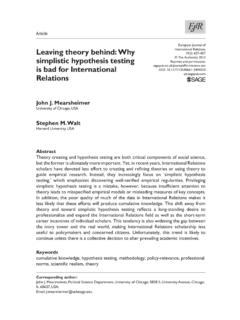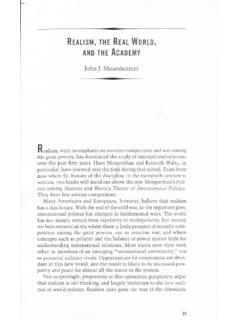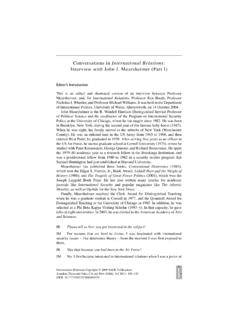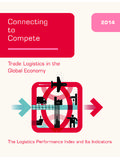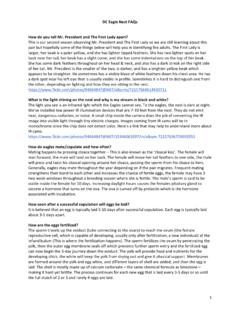Transcription of 05-IRT-Chap04.qxd 31/07/06 03:03 PM Page 71 4 Structural ...
1 4 Chapter contents Introduction Why do states want power? How much power is enough? What causes great power war? ConclusionReader s guideThis chapter examines a body of realist theories that argue states care deeply aboutthe balance of power and compete among themselves either to gain power at theexpense of others or at least to make sure they do not lose power. They do so becausethe structure of the international system leaves them little choice if they want tosurvive. This competition for power makes for a dangerous world where states some-times fight each other. There are, however, important differences among structuralrealists. In particular, defensive realists argue that Structural factors limit how muchpower states can gain, which works to ameliorate security competition. Offensiverealists, on the other hand, maintain that the system s structure encourages states tomaximize their share of world power, to include pursuing hegemony, which tends tointensify security competition.
2 The subsequent analysis revolves around four do states want power? How much power do they want? What causes war? CanChina rise peacefully (the thematic of the case study)?. Structural RealismJOHN J. 31/07/06 03:03 PM Page 7172 JOHN J. MEARSHEIMERI ntroductionRealists believe that power is the currency of international politics. Great powers, the mainactors in the realists account, pay careful attention to how much economic and militarypower they have relative to each other. It is important not only to have a substantialamount of power, but also to make sure that no other state sharply shifts the balance ofpower in its favour. For realists, international politics is synonymous with power are, however, substantial differences among realists. The most basic divide isreflected in the answer to the simple but important question: why do states want power?
3 For classical realists like Hans Morgenthau (1948a), the answer is human nature. Virtuallyeveryone is born with a will to power hardwired into them, which effectively means thatgreat powers are led by individuals who are bent on having their state dominate its can be done to alter that drive to be all-powerful. A more detailed treatment ofclassical realism can be found in Chapter Structural realists, human nature has little to do with why states want , it is the structure or architecture of the international system that forces states topursue power. In a system where there is no higher authority that sits above the greatpowers, and where there is no guarantee that one will not attack another, it makeseminently good sense for each state to be powerful enough to protect itself in the event itis attacked. In essence, great powers are trapped in an iron cage where they have littlechoice but to compete with each other for power if they hope to realist theories ignore cultural differences among states as well as differencesin regime type, mainly because the international system creates the same basic incentivesfor all great powers.
4 Whether a state is democratic or autocratic matters relatively littlefor how it acts towards other states. Nor does it matter much who is in charge of conduct-ing a state s foreign policy. Structural realists treat states as if they were black boxes:they are assumed to be alike, save for the fact that some states are more or less powerfulthan is a significant divide between Structural realists, which is reflected in the answerto a second question that concerns realists: how much power is enough? Defensive realistslike Kenneth Waltz (1979) maintain that it is unwise for states to try to maximize theirshare of world power, because the system will punish them if they attempt to gain toomuch power. The pursuit of hegemony, they argue, is especially John Mearsheimer (2001) take the opposite view; they maintain that it makesgood strategic sense for states to gain as much power as possible and, if the circumstancesare right, to pursue hegemony.
5 The argument is not that conquest or domination is goodin itself, but instead that having overwhelming power is the best way to ensure one s ownsurvival. For classical realists, power is an end in itself; for Structural realists, power is ameans to an end and the ultimate end is is based on the material capabilities that a state controls. The balance of power ismainly a function of the tangible military assets that states possess, such as armoureddivisions and nuclear weapons. However, states have a second kind of power, latent power,which refers to the socio-economic ingredients that go into building military power is based on a state s wealth and the size of its overall population. 31/07/06 03:03 PM Page 72powers need money, technology, and personnel to build military forces and to fight wars,and a state s latent power refers to the raw potential it can draw on when competing withrival states.
6 It should be clear from this discussion that war is not the only way that statescan gain power. They can also do so by increasing the size of their population and theirshare of global wealth, as China has done over the past few us now consider in greater detail the Structural realists explanation for why statespursue power, and then explore why defensive and offensive realists differ about howmuch power states want. The focus will then shift to examining different Structural realistexplanations about the causes of great power war. Finally, I will illuminate these theoret-ical issues with a case study that assesses whether China can rise do states want power?There is a simple Structural realist explanation for why states compete among themselvesfor power. It is based on five straightforward assumptions about the international of these assumptions alone says that states should attempt to gain power at eachother s expense.
7 But when they are married together, they depict a world of ceaselesssecurity first assumption is that great powers are the main actors in world politics and theyoperate in an anarchic system. This is not to say that the system is characterized by chaosor disorder. Anarchy is an ordering principle; it simply means that there is no centralizedauthority or ultimate arbiter that stands above states. The opposite of anarchy is hierarchy,which is the ordering principle of domestic second assumption is that all states possess some offensive military capability. Eachstate, in other words, has the power to inflict some harm on its neighbour. Of course, thatcapability varies among states and for any state it can change over third assumption is that states can never be certain about the intentions of otherstates. States ultimately want to know whether other states are determined to use force toalter the balance of power (revisionist states), or whether they are satisfied enough with itthat they have no interest in using force to change it (status quo states).
8 The problem, how-ever, is that it is almost impossible to discern another state s intentions with a high degreeof certainty. Unlike military capabilities, intentions cannot be empirically are in the minds of decision-makers and they are especially difficult to might respond that policy-makers disclose their intentions in speeches and policydocuments, which can be assessed. The problem with that argument is policy-makerssometimes lie about or conceal their true intentions. But even if one could determineanother state s intentions today, there is no way to determine its future intentions. It isimpossible to know who will be running foreign policy in any state five or ten years fromnow, much less whether they will have aggressive intentions. This is not to say that statescan be certain that their neighbours have or will have revisionist goals.
9 Instead, theargument is that policy-makers can never be certain whether they are dealing with arevisionist or status quo REALISM73 31/07/06 03:03 PM Page 7374 JOHN J. MEARSHEIMERThe fourth assumption is that the main goal of states is survival. States seek to maintaintheir territorial integrity and the autonomy of their domestic political order. They canpursue other goals like prosperity and protecting human rights, but those aims mustalways take a back seat to survival, because if a state does not survive, it cannot pursuethose other fifth assumption is that states are rational actors, which is to say they are capable ofcoming up with sound strategies that maximize their prospects for survival. This is not todeny that they miscalculate from time to time. Because states operate with imperfectinformation in a complicated world, they sometimes make serious , none of these assumptions by themselves says that states will or should competewith each other for power.
10 For sure, the third assumption leaves open the possibility thatthere is a revisionist state in the system. By itself, however, it says nothing about why allstates pursue power. It is only when all the assumptions are combined together thatcircumstances arise where states not only become preoccupied with the balance of power,but acquire powerful incentives to gain power at each other s begin with, great powers fear each other. There is little trust among them. They worryabout the intentions of other states, in large part because they are so hard to divine. Theirgreatest fear is that another state might have the capability as well as the motive to attackthem. This danger is compounded by the fact that states operate in an anarchic system,which means that there is no nightwatchman who can rescue them if they are threatenedby another country.
